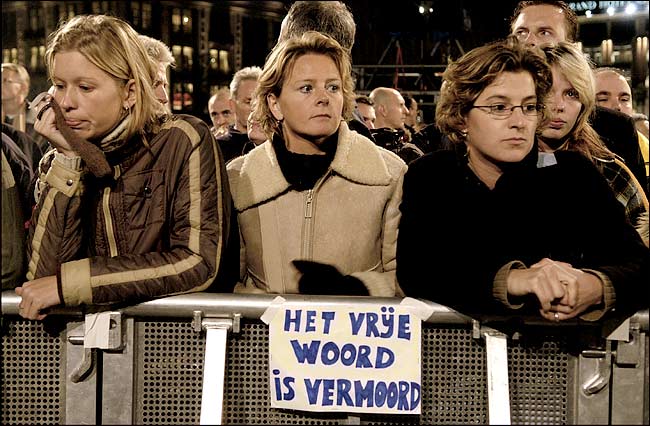|
November 14, 2004
Tolerant Dutch Wrestle With Tolerating IntoleranceBy BRUCE BAWER
But underneath the show of gezelligheid, Dutch life these days is far from cozy and communal. The vicious killing on Nov. 2 of Theo van Gogh, the director of a recent film that criticized the treatment of women under Islam, shocked a nation where only two years earlier the politician Pim Fortuyn was assassinated by a Dutchman reacting to Mr. Fortuyn's criticism of Islam. Three days after Mr. van Gogh's murder, I traveled to Amsterdam to see for myself how things were going. It seemed a long time since 1999, when I lived in a largely Muslim neighborhood of Amsterdam only a block from the mosque attended by the man accused in Mr. van Gogh's murder. During my time there, I quickly came to see that the city (and, I later recognized, Western Europe generally) was a house divided against itself. The division was stark: The Dutch had the world's most tolerant, open-minded society, with full sexual equality and same-sex marriage, as well as liberal policies on soft drugs and prostitution; but a large segment of the fast-growing Muslim population kept that society at arm's length, despising its freedoms. Instead of addressing this issue, Dutch officials (like their counterparts across the continent) churned out rhetoric about multicultural diversity and mutual respect. By tolerating Muslim intolerance of Western society, was the Netherlands setting itself on a path toward cataclysmic social confrontation? When I tried to broach the topic, Dutch acquaintances made clear it was off limits. This reticence still applied in February 2002, when Mr. Fortuyn argued that radical Islam was capable of destroying and depleting his country. His comments got him expelled from his party. Though many in the country shared his views, those views remained anathema to the political and media establishment. No more. After the murder of Mr. van Gogh, whose accused killer belonged to a radical Muslim network, Dutch newspapers were filled with long articles that sounded like Mr. Fortuyn. Jihad has reached the Netherlands, one commentator wrote. Another asked: Has the Netherlands become a country in which you can no longer say what you want, or does the taboo apply only to Islam? (This is a nation, after all, to which people fled centuries ago to speak and write freely.) Not since 9/11 have I seen any country's news media outlets so preoccupied with a single topic. The Netherlands is undergoing a sea change. By the time I arrived, much had already happened. There had been several arrests; legislators had been placed under round-the-clock protection; government buildings in The Hague looked like an armed camp. The deputy prime minister, Gerrit Zalm, who once called Mr. Fortuyn dangerous because of his blunt words about Islam, declared war on radical Islamism though some officials rushed to question the word "war," while others accused the government of being too resigned in its reaction. Four days after Mr. van Gogh's murder, I found my way to the scene of the crime. I foolishly assumed I would have trouble locating the exact spot. In fact, an area of about 75 feet by 10 feet along one side of Lijnbaanstraat had been cordoned off. The street was piled high with floral tributes, and about 50 people crowded around them, most apparently deep in thought. I circled the site slowly, reading notes that had been left there. "This far and no further," read one. Another read: "Long live the Netherlands; long live the free word!" In my old, mostly Muslim neighborhood, a police officer told me flat out not to venture into such areas. The mood in all of the Netherlands is very tense right now, she explained. Earlier that day, she said, a journalist's car had been smashed, presumably by Muslims displeased with something he had written. Later, I learned that the Rotterdam police had destroyed a street mural featuring the words, "Thou shalt not kill," a picture of an angel, and the date of Mr. van Gogh's murder because the leader of a nearby mosque reportedly considered it racist. Wim Nottroth, a news cameraman who tried to protect it, was arrested, and a camerawoman who filmed its destruction was forced to erase part of her videotape, according to Dutch news reports. The incident, according to De Telegraaf, resulted from orders given to the police nationwide to be alert especially for any signs of disorder or provocation. A furious Mr. Nottroth opined afterward that the shock to the Dutch system is so extreme that a lot of people have no idea how to deal with the situation. I left my old neighborhood in a cab. Talking with the driver, I mentioned Theo van Gogh. Like many Dutchmen, he seemed reluctant at first to speak about such things to a foreigner. But then he said simply he was leaving the country. He said he was not alone. On Wednesday, police officers and marines carried out a daylong siege on an apartment in an immigrant neighborhood in The Hague. During the week, there were attacks on mosques and Muslim schools. (The concern has long existed that if liberals didn't address the problem of Muslim intolerance responsibly, it would be answered with the intolerance of the far right.) In the 1930's, Europe faced a struggle and, many thought, a need to choose between two competing totalitarianisms. Many analysts are wondering if this is Europe's future, as well. They also wonder whether the Dutch people's anger will blow over or whether they will act decisively to protect their democracy from the undemocratic enemy within. At present, most appear to agree strongly with one commentator, Paul Scheffer, who wrote in the daily NRC Handelsblad last weekend: "We cannot hand over our country.... Words such as diversity, respect and dialogue fade against the dark context of this ritual assassination." Bruce Bawer, who lives in Oslo, is the author of "Stealing Jesus," a book about Christian fundamentalism. |

